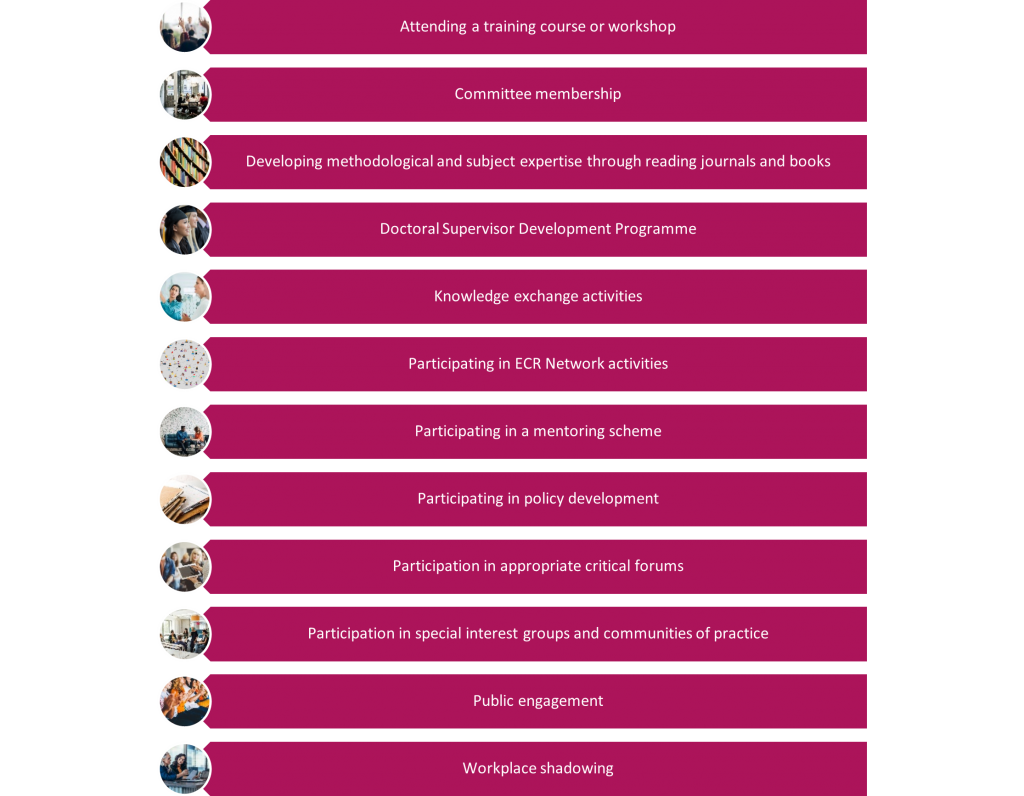What is it?
Continuing Professional Development (CPD) is the process of documenting the skills, knowledge and experience gained both formally and informally as you work. It can be the honing or further development of an existing skill or competence or the learning of a completely new one, the development of deeper knowledge and understanding of a subject area or building an expanding range of transferable skills e.g., leadership, project management. Examples of the types of activities which may constitute CPD activities for research-active staff are included below, though this is not exhaustive.

It is an ongoing process which helps you to review and enhance your current skills, identify gaps in your experience and to reflect on what you have learned enabling you to take a proactive approach to your career development and ambitions.
Why is CPD encouraged at Sheffield Hallam University?
Sheffield Hallam University is a signatory of The Concordat to Support the Career Development of Researchers. This is an agreement between the funders and employers of researchers in the UK. It sets out the expectations and responsibilities of each stakeholder in researcher careers – researchers themselves, their managers, employers, and funders.
The Researcher Concordat states that researchers must take ownership of their career, identifying opportunities to work towards career goals, including engaging in a minimum of 10 days’ professional development pro rata, per year. Under the Concordat, Researchers are defined as those “whose primary responsibility is to conduct research and who are employed specifically for this purpose.“ Whilst the University’s Concordat commitments only strictly apply to those meeting this definition, it is keen to promote broader engagement with and recognition of CPD for all research-active staff.
Further information on the implementation of the Concordat at Sheffield Hallam University is available at Researcher Concordat.
All staff are expected to discuss their development and the support required for their future career aspirations as part of the Performance and Development Review (PDR) process and we want to support you to do this.
Where to start?
The Vitae Researcher Development Framework (RDF) is a professional development framework for researchers. It describes the knowledge, behaviours and attributes of successful researchers and can be used by individual researchers at all stages of their career. Principal investigators and supervisors have a significant role in supporting the professional development of researchers. The RDF can help provide that support. It enables structured conversations with researchers about progress to becoming a well-rounded, capable and confident researcher. It can also be used to identify key areas to consider when drafting training and development plans in funding applications.
At Sheffield Hallam University, the Academic Careers Framework (ACF) translates the Transforming Lives strategy into a set of indicators that show the contribution academics can make in order to develop a successful career. It sets out expectations for academic achievement across; Academic citizenship and leadership (AC&L); Research and Innovation (R&I); Teaching and Learning (T&L); and External and professional engagement (E&PE). The ACF is a central part of the Performance and Development Review (PDR) process for academic staff and taking responsibility for your own development and engaging with CPD are core expectations under the AC&L strand.
Development Opportunities
There are a number of development opportunities available for research-active staff at Sheffield Hallam University, further details can be found on this website. You can also see details of upcoming activities from both Research and Innovation Services and the Research Institutes on the Events Calendar. Should you have a suggestion for a development activity, which you cannot see listed on the above pages, please email rida@shu.ac.uk.
Recording your CPD Activities
It is now possible to record your CPD activity within your employee profile on Core Portal. With this, you can now record activities such as board/committee membership, courses, knowledge exchange activities, meeting/conference attendance, public engagement activities and more. Please see the instructions for adding CPD activity to your profile for further information.
What are the Benefits of Recording my CPD?
As an individual, recording your CPD activity within your Core Portal profile enables you to compile your development activities in one place which you can use to inform career development conversations with your manager, PDR reviewer or mentor. It also provides material for your CV; job, promotion or fellowship application/interview; and evidence to submit to professional bodies as part of their reporting requirements for membership or course accreditation. The process of actively engaging with a formal CPD record also enables you to highlight gaps in skills/capabilities, to reflect on your achievements and keep on track of your career development.
As an organisation, the University has a duty under the Researcher Development Concordat to demonstrate how it is meeting its responsibilities, this includes providing evidence for the engagement of researchers and their managers with professional development activities, and researcher career development reviews. As a Concordat signatory, Sheffield Hallam University is committed to 10 days CPD for researchers.
